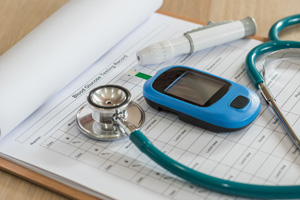 We've all heard of type 2 diabetes. It's when blood sugar levels rise because our body can't properly process sugars in the food we eat.
We've all heard of type 2 diabetes. It's when blood sugar levels rise because our body can't properly process sugars in the food we eat.
Before type 2 diabetes, there's usually prediabetes. That's when sugar (or glucose) levels are higher than normal, but not as high as with type 2 diabetes.
Prediabetes happens when your body's cells become less sensitive to insulin, the blood-sugar processing hormone made by your pancreas.
Insulin resistance may be caused by being overweight. Other factors include not exercising enough, having a family history of the disease and being older. Drinking sugar-heavy drinks has also been linked to diabetes.
Did you know:
1. About 1 in 3 U.S. adults has prediabetes. That's more than 84 million people ages 18 and older.
2. Prediabetes usually has no symptoms. You'll need a blood test to know for sure.
3. Being diagnosed with prediabetes doesn't mean that you'll definitely develop type 2 diabetes, particularly if you change your lifestyle.
4. Prediabetes can be reversed by eating healthy foods, getting moderate exercise on a regular basis and taking your medication properly.
5. A healthy meal plan for people with prediabetes and diabetes includes: plenty of non-starchy vegetables, limited added sugars, whole-grain foods instead of refined grains and whole foods instead of highly processed foods.
6. Sugary drinks have been linked to type 2 diabetes. A 12-ounce can of regular soda has the equivalent of 10 teaspoons of sugar. Cut back on these beverages to lower your blood sugar levels:
• Regular soda.
• Fruit punch.
• Energy drinks.
• Sweet tea.
• Sweetened coffee drinks.
• Sports drinks.
7. Exercise makes your cells more sensitive to insulin. That lowers blood sugar levels and helps to reverse prediabetes. Aim for 150 minutes of moderate exercise each week.
Concerned about prediabetes or diabetes? Your Watson Clinic Internal Medicine or Family Medicine provider can help you make changes today to prevent or reverse this disease. Call 863-680-7190 to schedule an appointment.
Sources: American Diabetes Association; National Institute of Diabetes and Digestive and Kidney Diseases